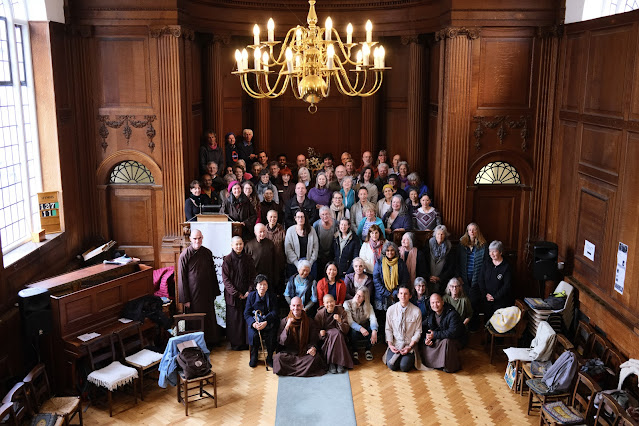Free Religion is bowing to each other—a thought following the visit to the Cambridge Unitarian Church of eight monastics from Thich Nhat Hahn's Plum Village Community
 |
| The group photo from the last day (just click on this, or any other photo, to enlarge it) |
(A recorded version of the following piece can be found at this link)
This week, as minister of the Cambridge Unitarian Church, along with a number of other church members, I was pleased, and honoured, to welcome into our buildings eight monastics from Thich Nhat Hahn’s Plum Village Community of Engaged Buddhism (and HERE is the link for the UK site) for two-days of mindfulness meditation, centred particularly on the theme of “healing ourselves and the earth.” I could write many things about this but, if you want to know more about Thich Nhat Hahn and Plum Village, I think the best place to go looking is their own website linked to above or, even better, to speak to the two members of our own community who have been very actively involved in it for many years.
But here, to accompany a few photos I took during the course of the event, I want to present three things that relate to why it made sense for me to offer our building for the use of the eight monastics and the one hundred-plus members of various British-based Plum Village sanghas who attended over the course of the two days.
 |
| J. Estlin Carpenter (click to enlarge) |
Secondly, it’s worth being mindful of (no pun intended!) the fact that, since 2010, this church has incorporated a mindfulness meditation practice into it’s own worship. And, thanks again to Estlin Carpenter’s work and personal interests, we have had, and continue today to develop, the now 120 year old links that exist between Unitarians and another Mahayana Buddhist tradtion, namely the Japanese, Pure Land Buddhist tradition of Jodo-Shinshu Shin Buddhism. Indeed, in just a couple of weeks time, on Sunday 4th June, we are being joined by the Revd Miki Nakura, a New York-based, Japanese Jodo-Shinshu Shin-Buddhist priest. And, after sharing lunch together, from 2pm, he will be teaching us Seiza meditation, the type of quiet sitting that became central to many figures in the twentieth-century Japanese yunitarian (sic) movement. Not incidentally, Nakura sensei has, himself, a great respect for Thich Nhat Hahn and, should you wish, you can read a piece he recently wrote for the Higashihonganji USA site called, Thich Nhat Hahn’s Koan, at this link.
 |
| Imaoka Shin’ichirō (1881-1988) (click to enlarge) |
I cite his words because, throughout the two-day visit of the Plum Village monastics, there was much bowing to one another. Looking in from the outside, I can see how all this bowing, especially by me as a liberal, Free Religious minister, could be seen as mere, external, affectation. But that’s not the case, or, at least, that’s not been the case for a long time since my encounter with Imaoka sensei’s life and work and an increasing commitment to, and embrace of, his basic way of being-in-the-world. As you will read in a moment, for him, “Free Religion is bowing to each other.”
We Japanese say that to show respect, one should bow. When you borrow something from somebody, you should bow. When you admire something, you should bow. Writing a letter to someone is a kind of bowing. No matter what you do, you should bow while you are doing it. In this way we bow, and we are bowed to. God did not create the universe where there was nothing. When you go to a religious school, there is the difficult subject of the theory of the one and only God, and they try to prove the existence of God based on this theory. But we are not talking about such a difficult concept, just about bowing when you write a letter and when you look at something. People are very incomplete, but they have the capacity to show mutual respect by bowing to each other. Creative humanity manifesting universal freedom is God. We are trying to build a cooperative society in which we bow to such a God and bow to each other.
We do not always act with subjectivity. With self-realization, this universe is God — it is paradise. We become gods and paradise. I think religion must be like this.
Free Religion is not merely the freedom of religion or religious freedom, and not just getting along with each other. Of course, it is fine to have a religious peace movement, but that alone is not enough. There is something beyond peace. Even with peace, we will have problems. After the peace, there will be conflict. Each new day brings struggle.
Therefore, Free Religion is bowing to each other, joining each other in vigorously promoting the progress without limit of our universe.

















Comments